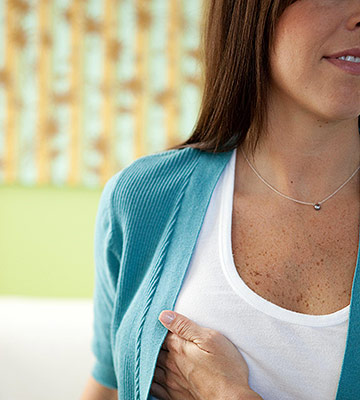If you're experiencing breast pain during pregnancy, you are not alone. Sore (and tender) breasts are one of the earliest symptoms. Many expectant parents report feeling some discomfort at or around six weeks. But what causes breast pain during pregnancy and, more importantly, how can you relieve it? Here's everything you need to know.
What Causes Breast Pain During Pregnancy?
After the egg is fertilized, your body begins to produce pregnancy hormones—namely estrogen, progesterone, and prolactin—that stimulate your breasts and cause the milk glands inside them to grow to prepare for their starring role in feeding your newborn. (FYI, this also what's behind that wow-cleavage you're likely experiencing these days.) What you're feeling is actually growing pains as your breasts prepare for lactation, and the discomfort may come and go over the course of your pregnancy. "Most people experience tissue swelling in the first trimester, which causes breasts to become sore and tender," says James E. Ferguson II, M.D., professor and department chair of obstetrics and gynecology at the University of Virginia School of Medicine. And all that ruckus in your chest can be blamed on your ever-changing body chemistry.
First, the pregnancy hormones progesterone and human chorionic gonadotropin (hCG) cause an increase in blood volume throughout the body. This causes your breasts to plump up. Next, hormones trigger changes in the melanocytes, or pigment cells, that give your nipples their color. Pale cells slough away and darker ones rise to the surface, making your nipples more pronounced, which will ultimately help your baby see them more easily. "This could explain why some people experience sensitive nipples during pregnancy," says Sharon Phelan, M.D., a professor of obstetrics and gynecology at the University of New Mexico Health Science Center School of Medicine.
Then, still more hormones signal the milk ducts in your breasts to activate around your third month of pregnancy. "Estrogen and progesterone made by the placenta promote the development of the ducts within the breast tissue," says Patrick Duff, M.D., an OBGYN at the University of Florida, Gainesville. "The ducts get larger and begin to produce and store colostrum, the early form of breast milk," says Duff. This can cause your breasts to ache because those cells have to stretch out to make room.
All of these rapid changes result in your breasts feeling rather uncomfortable—tender to the touch, prickly, and just plain sore. But luckily, the pain eases up as pregnancy progresses. "Most people get used to the discomfort after the first few weeks and don't even realize it when the pain goes away completely later in their pregnancy," says Dr. Phelan. This means you should have some time to enjoy your new ample bosom for a bit before the little one arrives.

What Relieves Breast Tenderness During Pregnancy?
While breast soreness will (more likely than not) ease up as your pregnancy progresses, there are a few things you can do to help ease your discomfort.
What Causes Breast Pain After Pregnancy?
You thought you'd finally escape breast pain now that you delivered your beautiful baby; sadly, this is not the case. Most people will have full, rock-hard, and painful breasts when their milk comes in, usually starting three or four days after the birth. This is known as engorgement and is normal. Some pain will also experience pain or discomfort baby feeds.
How Long After Giving Birth Will Breast Pain Last?
The good news is engorgement will go away on its own, when you feed your little and/or after the body determines how much milk needs to be made. Pain during feeding also tends to sort itself out. However, if the pain is persistent, you can (and should) see your doctor.
Parents Magazine
